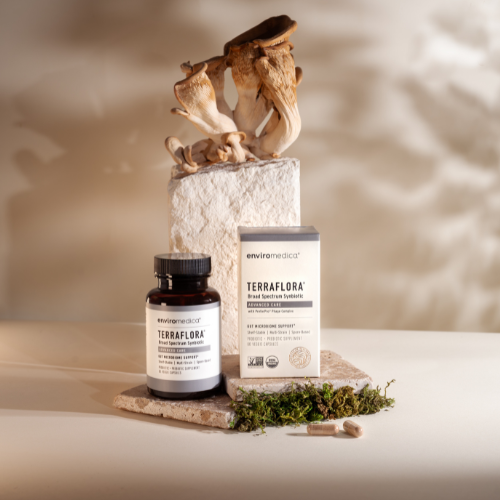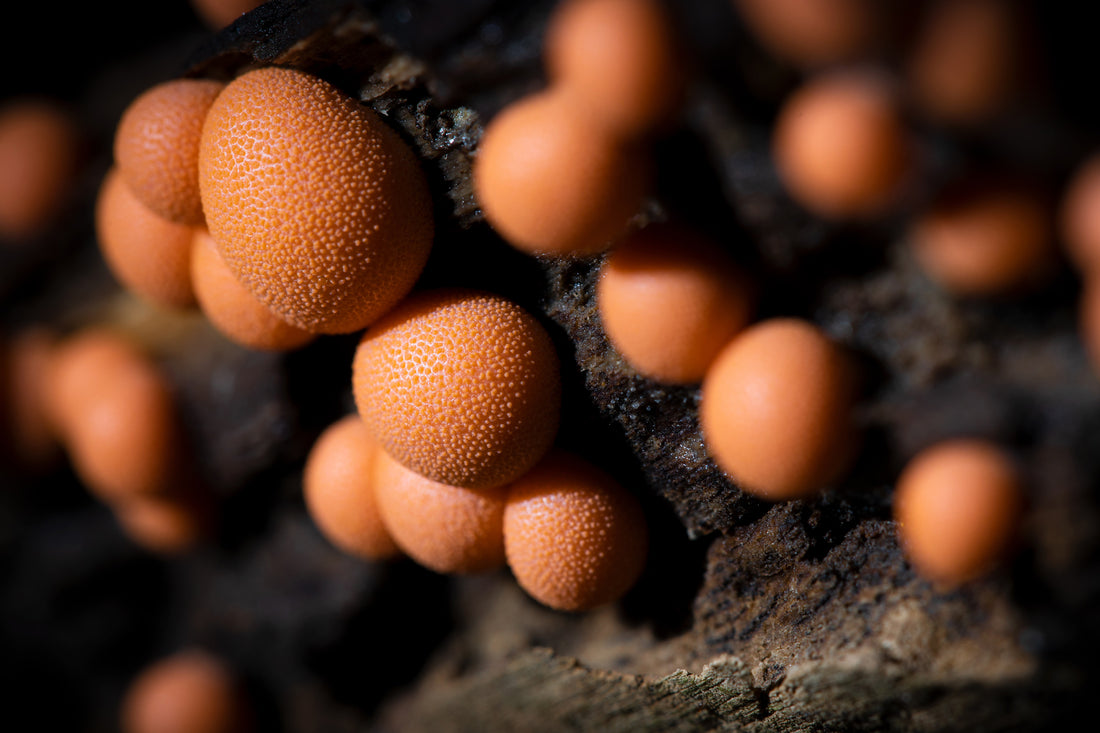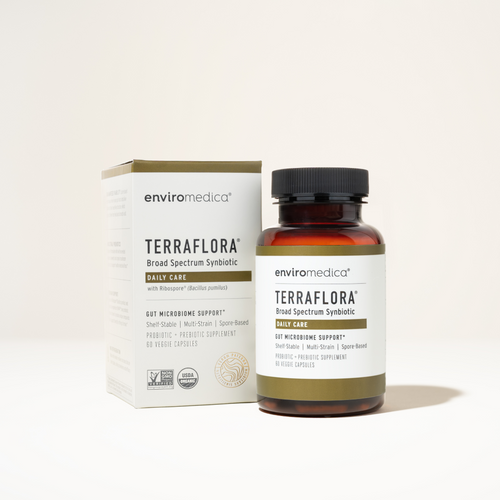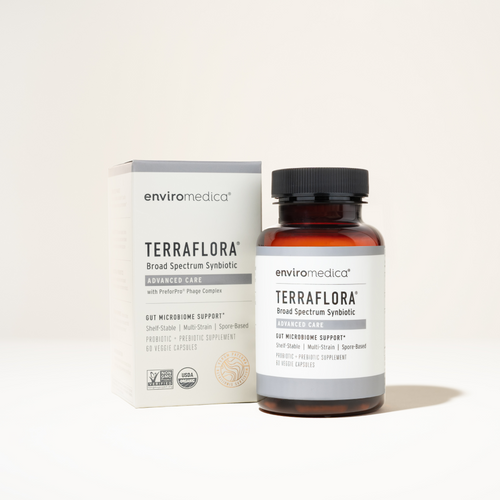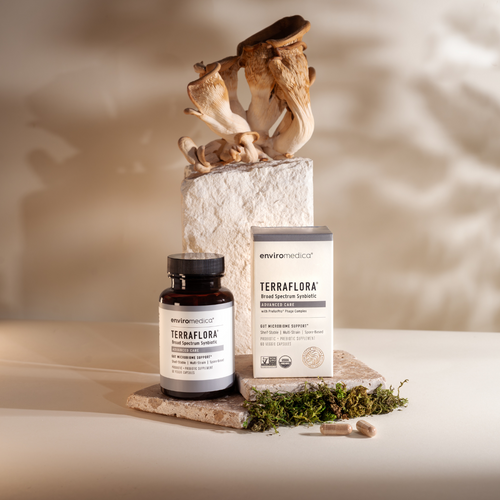The microbiome and our bodies
The microbiome, and its impact throughout the body is seemingly unending.
Technically speaking, the microbiome is the collection of genes of all the microbes within a human’s individual microbiota. The number of genes in our microbiome outnumber the genes in our genome by about 100 to 1!
As humans we are essentially a walking ecosystem, carrying around this microbiome which is infinitely more complex than our own genome. This massive community within our body has a very interesting relationship with its host. When balanced and healthy, it provides tremendous support all throughout the human body and the effects go far beyond digestive health, contrary to what many may think. The downside is, when it gets out of balance there is the potential for system.
Defining the gut
Microbe: This is a microscopic living organism, which may be single celled or multicellular.1
Microbiota: The ecological community of commensal, symbiotic and pathogenic microorganisms that literally share our body space.2
Microbiome: This is very similar to the microbiota and some use it interchangeably, but it is referring to the collective genome of the microbes, not the microorganisms themselves.3
The microbiome can almost be looked at as an additional organ beyond what most have learned and can account for between 1-3% of total body mass.4 The primary location of the microbiome is in the gut, but as researchers have demonstrated, its existence is far broader than you would think. Humans have measureable microbiota on essentially every surface and orifice of the body.5
The importance of a balanced microbiome
This wide spread prevalence results in the normal commensal nature of the microbiome being of the utmost importance. Imagine a web-like system spanning essentially every aspect of the human body – this would be pretty close to the predominance within the body that the microbiome carries. The challenge with this is that if you were to snap one of the strands in the web, it might be ok, but continue to break threads and balance becomes lost and eventually the system starts to crumble.
This balance is no less important for the microbiome than an intricate web a spider may produce. When the balance and symbiotic nature of the individual microbes begin to tip, one way or another the “host” of the microbiome with the microbe changes, and the body may be challenged to maintain its current health. All the while, the “host” may not necessarily understand why certain aspects of their health are needing more attention.
What does the research say?
Researchers have learned that our part of the symbiotic relationship with our microbiome is to provide it with a “home” and the proper nutrients, for the microbiota within to continue to survive. In return our microbes provide by-products essential to the healthy function of many processes within the human body. The challenge is when this relationship is not respected and balance is lost. This loss of balance allows non-commensal, opportunistic, or pathogenic bacteria to enter the fray and put down roots, resulting in any number of health challenges.
Researchers have identified many health benefits of a properly functioning microbiome. These benefits can be wide ranging, but seem to provide support for healthy immune function, energy balance and mood. While more information is being uncovered constantly, it has been well established that the mammalian immune system is designed to help protect the host from invading microorganisms.
Recent research is emerging in the field of host-microbe interactions, showing that commensal microbiota are likely a primary driver of immune development, and in turn the immune system shapes the composition of the microbiota.6
In addition to the effects on immune health, researchers have discovered that developing obesity is far more than just how many calories one ingests. They have shown that those who are obese and those who are lean have fundamentally different balances of certain microbes within their own microbiota. An observation has been that larger numbers of a specific bacteria – Bacteroidetes and fewer of another – Firmicutes are seen in lean individuals. This suggests that when the opposite exists, there is an ability to extract and digest a high level of calories from ingested food.7
Much recent research on the microbiome has been in regards to mood and mental health and the results are pretty amazing. Studies are demonstrating that a microbiota-gut-brain axis exists, which points to the fact that maintaining a healthy balanced microbiome is an essential component of supporting healthy mood and mental health.8
The future and your microbiome
Beyond antibiotic resistance, our use of antimicrobials to cleanse away what we see as harmful trespassers is actually doing more harm than good.
Our understanding of the microbiome is still very basic and it will be very exciting to see where the research goes in years to come. Many evolutionary biologists are starting to believe that the genome and content of the microbiota of a human is just as important as the individual’s genes.
When new microbes are introduced and allowed to proliferate, which can occur due to any myriad of reasons, significant changes in health can be an unwanted and difficult to identify consequence. With the varied sources that can affect the delicate stability of one’s microbiota, one should be very careful and a vigilant steward in maintaining the health and balance of their microbiome.
One thing that is of the utmost importance though, is to live your life in a way that you are consciously making choices to support the health of your microbiome. In today’s day and age it is all too easy for the microbiome to decline in function, creating any number of challenges throughout the body.
References
- 1. Madigan M, Martinko J (editors) (2006). Brock Biology of Microorganisms (13th ed.). Pearson Education. p. 1096.
- 2. The NIH Human Microbiome Project. Genome Res 19 (12): 2317–2323. 2009
- 3. Backhed, F; Ley, R.E.; Sonnenburg, J.L.; Peterson, D.A.; Gordon, J.I. (2005).Host-Bacterial Mutualism in the Human Intestine. Science 307: 1915–1920
- 4. MacDougall, Raymond (2012). NIH Human Microbiome Project defines normal bacterial makeup of the body
- 5. Cho, I., & Blaser, M. J. (2012). The human microbiome: at the interface of health and disease. Nature Reviews. Genetics, 13(4), 260–70
- 6. Martin, R., Nauta, a J., Ben Amor, K., Knippels, L. M. J., Knol, J., & Garssen, J. (2010). Early life: gut microbiota and immune development in infancy. Beneficial Microbes, 1(4), 367–82
- 7. DiBaise, J. K., Zhang, H., Crowell, M. D., Krajmalnik-Brown, R., Decker, G. A., & Rittmann, B. E. (2008). Gut Microbiota and Its Possible Relationship With Obesity. Mayo Clinic Proceedings, 83(4), 460–469
- 8. Cryan, J. F., & Dinan, T. G. (2012). Mind-altering microorganisms: the impact of the gut microbiota on brain and behaviour. Nature Reviews. Neuroscience, 13(10), 701–12
